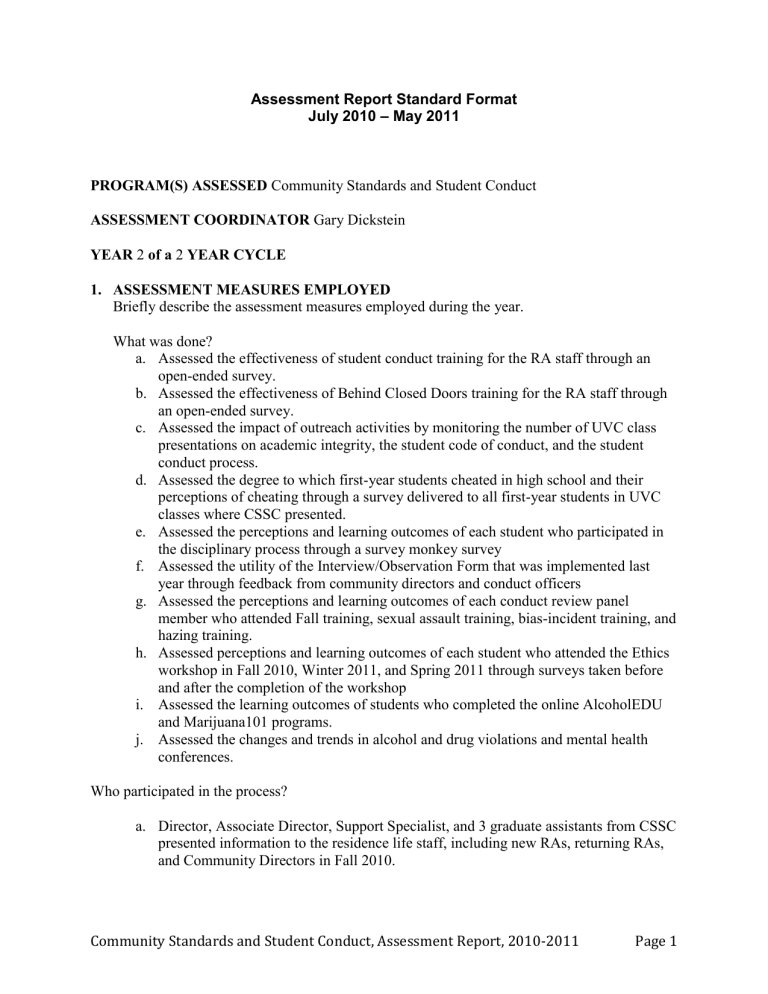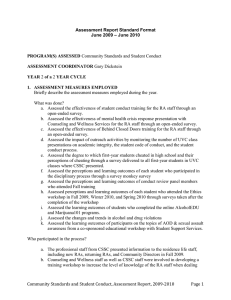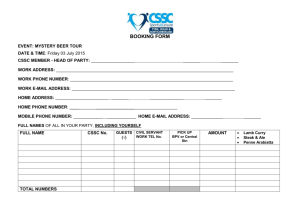Community Standards Student Conduct

Assessment Report Standard Format
July 2010 – May 2011
PROGRAM(S) ASSESSED Community Standards and Student Conduct
ASSESSMENT COORDINATOR Gary Dickstein
YEAR 2 of a 2 YEAR CYCLE
1.
ASSESSMENT MEASURES EMPLOYED
Briefly describe the assessment measures employed during the year.
What was done? a.
Assessed the effectiveness of student conduct training for the RA staff through an open-ended survey. b.
Assessed the effectiveness of Behind Closed Doors training for the RA staff through an open-ended survey. c.
Assessed the impact of outreach activities by monitoring the number of UVC class presentations on academic integrity, the student code of conduct, and the student conduct process. d.
Assessed the degree to which first-year students cheated in high school and their perceptions of cheating through a survey delivered to all first-year students in UVC classes where CSSC presented. e.
Assessed the perceptions and learning outcomes of each student who participated in the disciplinary process through a survey monkey survey f.
Assessed the utility of the Interview/Observation Form that was implemented last year through feedback from community directors and conduct officers g.
Assessed the perceptions and learning outcomes of each conduct review panel member who attended Fall training, sexual assault training, bias-incident training, and hazing training. h.
Assessed perceptions and learning outcomes of each student who attended the Ethics workshop in Fall 2010, Winter 2011, and Spring 2011 through surveys taken before and after the completion of the workshop i.
Assessed the learning outcomes of students who completed the online AlcoholEDU and Marijuana101 programs. j.
Assessed the changes and trends in alcohol and drug violations and mental health conferences.
Who participated in the process? a.
Director, Associate Director, Support Specialist, and 3 graduate assistants from CSSC presented information to the residence life staff, including new RAs, returning RAs, and Community Directors in Fall 2010.
Community Standards and Student Conduct, Assessment Report, 2010-2011 Page 1
b.
Associate Director of CSSC co-coordinates Behind Closed Doors training. In Fall
2010, the Director, Associate Director, and 3 graduate assistants from CSSC participated in BCD to provide support on documenting situations, policy, and proper reporting to new and returning RAs. c.
Director, Associate Director, and 3 graduate assistants presented information about
CSSC to UVC courses in Fall 2010. d.
All students in UVC classes that were visited by CSSC staff completed a survey on their high school cheating experiences. e.
Each student who was involved in the student conduct process was sent an e-mail with a link to the evaluation and was requested to complete it. f.
Community Directors and conduct officers were asked to provide feedback on the utility of the Interview/Observation tool, which is used during conduct conferences. g.
All new conduct review panel members were invited to attend trainings. Those who attended were given the opportunity to give feedback on trainings through evaluation surveys. h.
Every student who was sanctioned to the ethics workshop and who attended all sessions was given the opportunity to complete a course survey on the final class meeting. i.
Most students who violated the alcohol or marijuana policy were required to complete the AlcoholEDU or Marijuana 101 on line workshop. j.
All conduct officers adjudicate cases of alcohol and drug violations. The Director and
Associate Director of CSSC along with staff from CWS intervene in mental healthrelated incidents.
2.
ASSESSMENT FINDINGS a.
RA Training
CSSC staff presented information on policy, the conduct process, documentation, and incident reporting with the new online database. While some RAs indicated that the presentations were long and boring, the vast majority of respondents indicated that the presentations were very informational, important, and helpful in understanding policies and procedures. b.
Behind Closed Doors Training
CSSC staff participated in the BCD training by attending the skit presentations.
CSSC staff served to answer questions about policy and procedure in handling situations in the residence halls. A survey was provided to all RAs. Feedback from both new and returning RAs indicated that BCD was fun, informative, and overall the best part of Fall RA training. c.
UVC Presentations
CSSC staff members presented information on academic integrity, the code of student conduct, and the student conduct process to 21 UVC classes in Fall
2010, compared to 11 in Fall 2009. We made contact with 374 students in 2010 compared to 204 students in 2009.
Community Standards and Student Conduct, Assessment Report, 2010-2011 Page 2
d.
UVC Academic Integrity Information
Surveys were administered to every student in the UVC classes who invited
CSSC staff to present. 326 out of 374 students (87%) indicated that they cheated in high school at least one time, compared to 168 out of 204 students (82%) from
Fall 2009. Information was also gathered on the number of times cheated (one, two, three, or more than three times) and reasons for cheating. e.
Conduct Process Survey
170 students completed the discipline process evaluation on survey monkey after going through the student conduct process between Fall 2010 and April 2011.
90% of the 170 respondents were first-time offenders going through the conduct process. Alcohol played a role in slightly less than half of these cases. 80% of all conduct conferences were reported to have taken between 15 and 30 minutes each. 49% of these cases were adjudicated by the Director or Associate Director,
48% were adjudicated by Residence Life staff and graduate assistants, and 5% were adjudicated by a hearing panel.
1.
87% indicated they felt that an opportunity was provided to them to tell “their” side of the story.
2.
77% indicated their side of the story regarding the incident was listened to by the conduct officer.
3.
52 % indicated they believed the sanction(s) they received as a result of their conduct conference were appropriate, compared to 22% who did not end up receiving sanctions, and 25% who indicated that the sanctions were not appropriate.
4.
84% indicated they believed the incident and consequences caused them to think more about how my behavior affected themselves or others.
5.
87% indicated the incident and its consequences have caused me to think more about how my behavior has affected them.
6.
94% indicated they believed as a result of the incident and consequences that they would be less likely to repeat the behavior in the future.
7.
75% indicated they were notified of their right to appeal during the meeting with the conduct officer.
8.
81% reported being treated with courtesy and respect during the conduct meeting. f.
Interview/Observation Check List
Community directors indicated overall that they no longer use the form. They responded that while the questions are sometimes useful, the full list of questions is not necessary to use during every conduct conference. They also indicated that they may be more likely to use it if it was incorporated into our new database system.
Community Standards and Student Conduct, Assessment Report, 2010-2011 Page 3
g.
Conduct Review Panel Training Evaluations
New Conduct Review Panel Members were trained in the Fall and received additional training during the Winter and Spring quarters. Topics that were covered during the supplemental training were sexual assault, bias-related incidents, and hazing. All panelists who attended the trainings completed evaluations on perceptions and learning outcomes of the trainings.
Eleven new panel members attended Fall training. Fall training evaluations showed that on average, the large majority of participants were satisfied with all sections and presentations of the day-long training. In short answer responses, the respondents described their favorite and least favorite presentations. This year, copies of the training manual and code of conduct were not printed for each panel member. The majority of panelists indicated that sending those documents electronically was sufficient to save paper. Panelists also gave varying suggestions to improve the training.
Five panel members attended training in February regarding Bias-Related incidents. Overall, they indicated satisfaction with the quality of the presentation and the information that was delivered.
Eleven panel members attended training in March for cases of Sexual Assault.
Overall, they indicated satisfaction with the quality of the presentation and the information that was delivered.
Six panel members attended training in April for cases of hazing. Overall, they indicated satisfaction with the quality of the presentation and the information that was delivered. h.
Ethics Workshop Evaluations
Ethics workshop is taught by the graduate assistants of CSSC. Each student who attended the Ethics Workshop as a sanction in Fall 2010 completed an evaluation after the course on perceptions and learning outcomes. Students in Winter 2011 and Spring 2011 workshop completed a pre- and post-evaluation to measure how perceptions and learning outcomes changed before and after completion of the course.
Eleven students completed the workshop in Fall 2010. Overall, the students agreed on average that the workshop was beneficial and positively influenced their understanding of ethical decision making. They also demonstrated learning by providing key points that they learned during the course through short answer response. Students disagreed on whether the sanction was ultimately appropriate for code violation. They also gave suggestions for improvements.
Five students completed the workshop in Winter 2011. The survey was adapted from Fall 2010 to include different questions, a pre-evaluation and a postevaluation. Prior to taking the course, students answered that they had a good
Community Standards and Student Conduct, Assessment Report, 2010-2011 Page 4
understanding of why they had to take the course and that they could benefit from this workshop. They were on average neutral as to whether the workshop as a sanction was appropriate. In the post-evaluation, it should be noted that two students are likely to not have given honest feedback, as one student answered
“Strongly Disagree” for all questions and another student answered “Strongly
Agree” for all questions. Regardless, results showed that students on average were between neutral and somewhat agree about their experience in the workshop.
They on average disagree about the appropriateness of the workshop as a sanction. Short answer responses revealed demonstrations of learning and suggestions for improvements to the course. i.
AlcoholEDU and Marijuana101
Most students who are found responsible of alcohol or drug violations are required to take an online course, either AlcoholEDU or Marijuana101. Students must pass a test and complete a follow-up survey to complete the course.
Alcohol EDU Workshop
In total, 78 Wright State University students participated in AlcoholEDU for
Sanctions (i.e. completed Survey 1 or the Pre-Test, at minimum) between Fall
2010 and April 2011. Eighty-three percent (83%) of students who participated in the AlcoholEDU surveys (ages 18 and over) completed the entire course, including all three surveys. Data from the Alcohol EDU survey indicates that the following:
Behavior Change
Wright State University students reported an increase in their expressions of social concern through care-taking behaviors.
Overall, Wright State University students reported an increase in the use of protective factors after completing the course. Most notably, the percentage of students who reported they think about their BAC while drinking increased substantially from 40% to 55%.
Students’ Experience with AlcoholEDU
Eight-nine percent (89%) of your students reported that AlcoholEDU prepared them to help in situations where they have identified an alcohol overdose.
Eighty-six (86%) of your students considered that AlcoholEDU prepared them to express concern to someone about their alcohol use.
Eighty percent (80%) of your students said they paid attention to the course.
Fifty-eight (58%) would recommend AlcoholEDU to other people.
Marijuana 101
Marijuana 101 statistics were not yet available for this academic year. j.
Drug, Alcohol, and Mental Health Incidents
Community Standards and Student Conduct, Assessment Report, 2010-2011 Page 5
Violation
Type
Alcohol
Drug
H&W
The following table presents a comparison of case data by quarter for the 2009-
2010 academic year and the 2010-2011 academic year. Health and Wellness
(H&W) is a conduct/counseling staff intervention.
*Case data is not complete for Spring 2011 statistics. The numbers reported include violations between beginning of Spring 2011 and May 6, 2011.
Fall
2009
46
26
15
Fall
2010
48
36
29
Winter
2010
61
20
10
Winter
2011
63
43
16
Spring
2010
49
20
9
Spring
2011*
30*
5*
11*
Total
09-10
156
66
34
Total
10-11*
141*
84*
56*
Case data demonstrates that alcohol violations have stayed consistent in the past two years. Drug violations and H&W conferences are significantly increased in
10-11 compared to 09-10. The possible causes of those increases are not yet known.
3. List the LEARNING OUTCOMES of the program.
Resident assistants will have an increased knowledge of the student conduct process, appropriate documentation procedures, and using the new online database from attending
RA training and Behind Closed Doors training.
UVC students will have an understanding of how to access the student code of conduct via out website, the basic principles and procedures of the student conduct process, and in particular, a better understanding of what constitutes violations of academic integrity policies.
Each student who is required to go through the student conduct process has a better understanding of student code policies, how their actions affected themselves and others, and are less likely to repeat the behavior in the future.
Each Conduct Review Panelist who attended any of the CRP trainings are prepared to hear cases of code violations, including interpreting incident reports and other relevant documents, the hearing process, appropriate questioning techniques, decision-making, and sanctions development. Additionally, those who attended the specialized trainings will have a better understanding of how to handle cases of the sexual misconduct, biasrelated incidents, and hazing.
Each student who completes the Ethics workshop will have a better understanding ethical decision making, the student conduct process, and campus resources.
Each student who is required to complete the AlcoholEDU. or Marijuana 101 class will achieve a passing score of at least 80% on the required posttest to insure retention of knowledge contained in the workshop chapters, and therefore, will have an increased level of knowledge regarding any future use of both substances.
3. PROGRAM IMPROVEMENTS
Alter some of the questions in the conduct process survey to obtain more detailed information from the participants about their perceptions of the process.
Community Standards and Student Conduct, Assessment Report, 2010-2011 Page 6
Continue making changes to the ethics workshop curriculum. Students are likely to begin the ethics workshop with an attitude of not wanting to attend because they were sanctioned. So far, they also still tend to leave with that attitude regardless of the demonstrated learning and general level of satisfaction with the workshop. Each class has revealed different suggestions regarding the amount of assignments, the amount of class discussion, and the meeting time of the class; those areas can continue to be varied.
Perform more detailed and intrinsic assessment on case numbers to determine possible causes for increases and decreases in violations over the past year(s).
4. ASSESSMENT PLAN COMPLIANCE
Explain deviations from the plan (if any).
None
5. NEW ASSESSMENT DEVELOPMENTS
Implementation of a new database will enable us to obtain more statistically accurate reports on violations. Additionally, we will be able to track specific phenomena which either haven’t existed previously or haven’t been tracked previously, i.e. illegal computer downloading violations, students with prior felony convictions.
In Summer 2011, a graduate intern will conduct a CAS (Council on the Advancement of
Standards in Higher Education) self-study of the Office of Community Standards and
Student Conduct. Additionally, in Fall 2011, a consultant will be contracted to perform an external review of the Office of CSSC.
Community Standards and Student Conduct, Assessment Report, 2010-2011 Page 7

